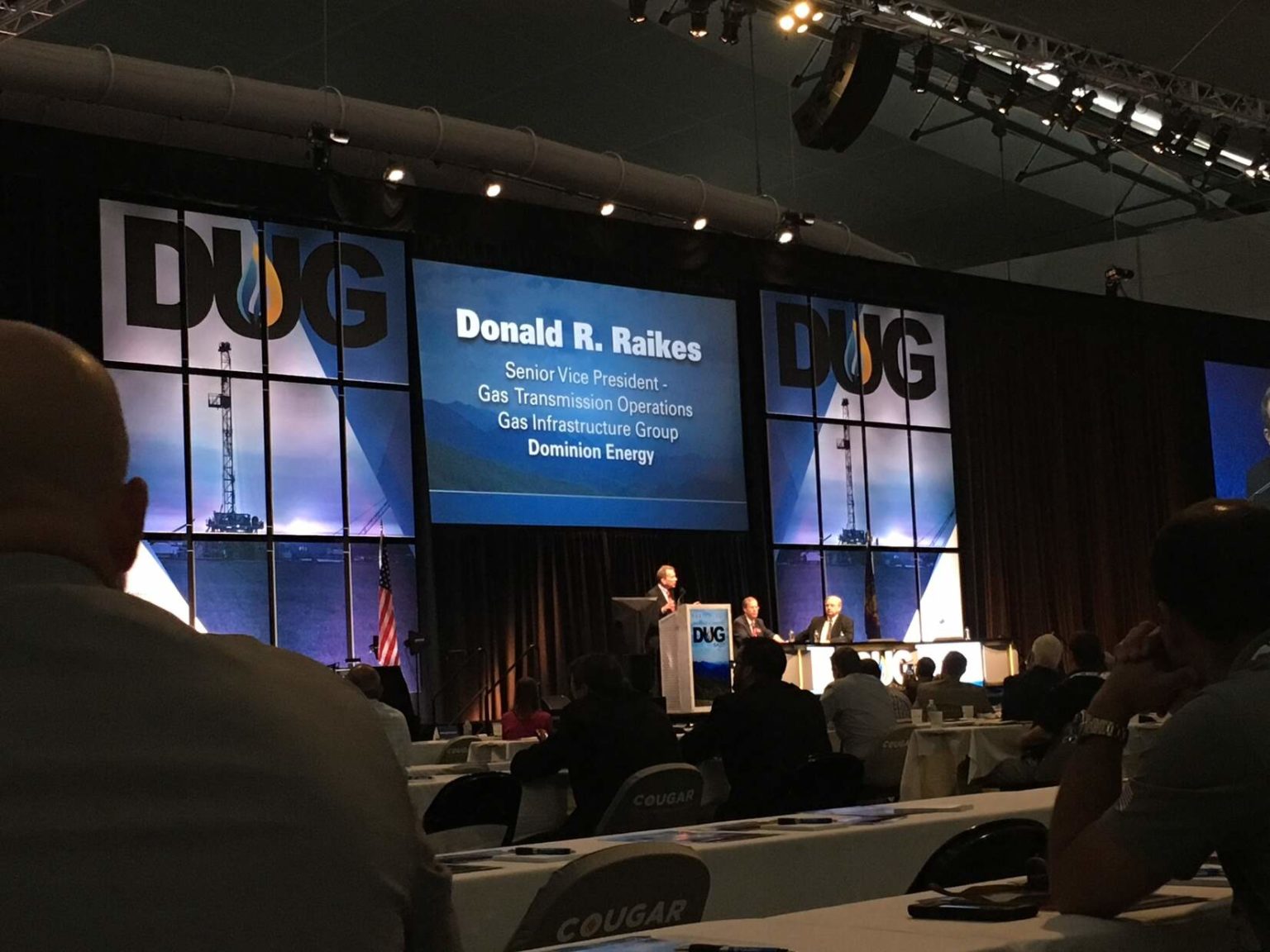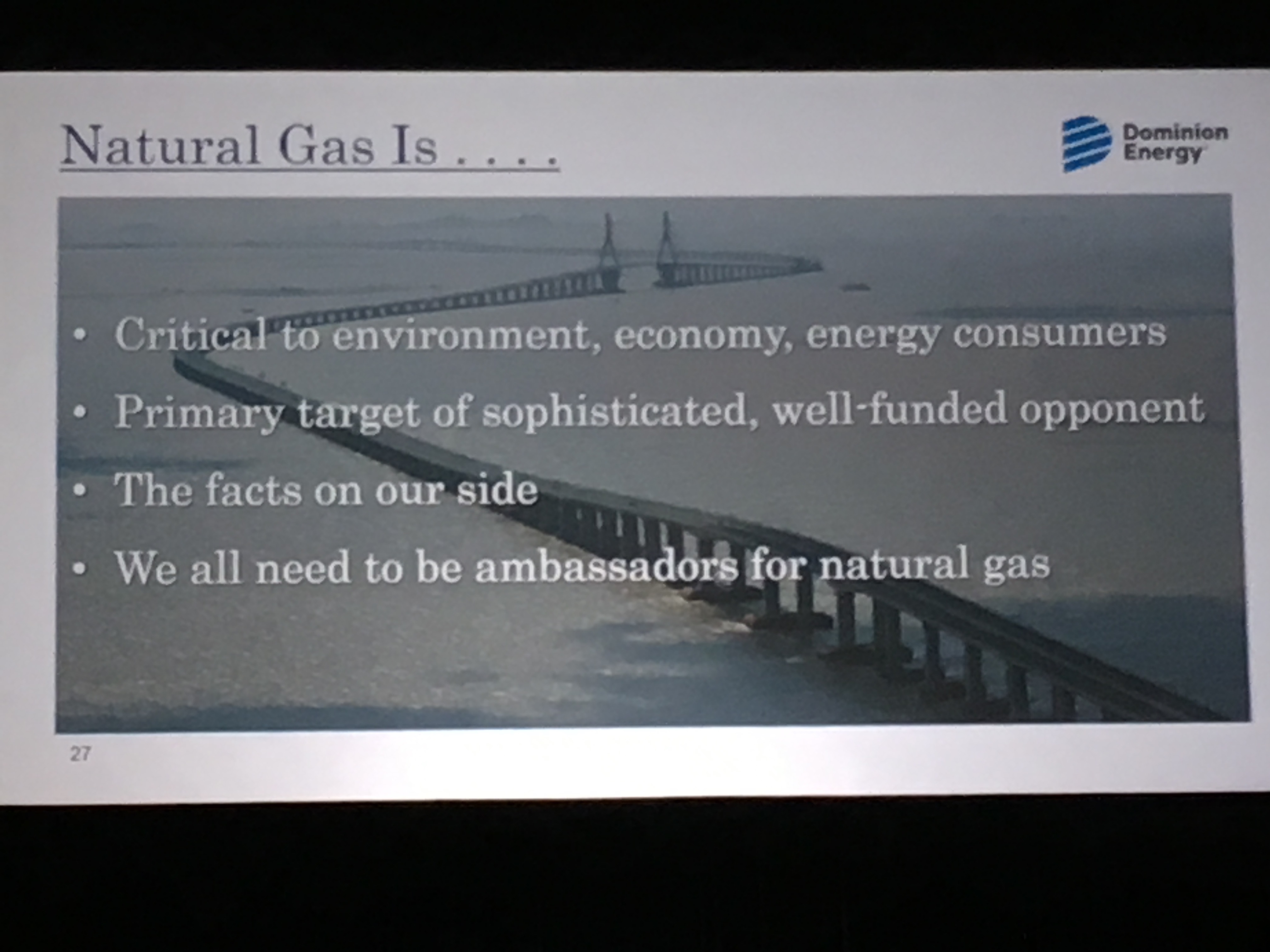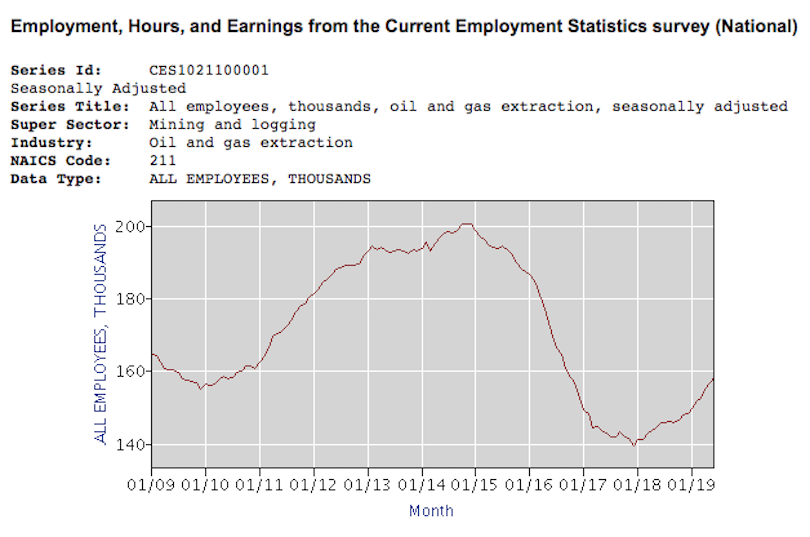Donald Raikes arrived at 2019’s DUG East conference, a major shale gas industry gathering in Pittsburgh, with a mixed set of messages for his fellow fossil energy officials.
“We are faced with a lot of challenges in this industry,” Raikes, senior vice president of gas infrastructure at Dominion Energy, said. “And this morning what I plan to do is use my time to carve out a call for action for all of us. We need to be very aware of the forces that are out there and how they are coming against us.”
What sorts of forces? Raikes warned specifically about opposition from environmental groups.
But Raikes also warned that the oil and gas industry was doing itself no favors by denying that it affects the environment, and he even dipped his toes into the issue of climate science denial.
“Regardless of how we feel about the term ‘climate change,’ the one thing I hope we all agree on is that each of us individually, as companies, impact the environment,” he said. “And it is our responsibility to do everything we can to make sure that we can be respectful in terms of that impact.”
“The second thing I’ll tell you that I think is very critical when we look at these issues and communication is this: We can’t sit on the sidelines and be climate deniers. We can’t, because we disagree with what they’re saying, we can’t stick our head in the sand,” he added. “We have to be a player at the table or this policy will be set without us.”
“We can’t sit on the sidelines and be climate deniers.” ~Donald Raikes, Dominion Energy
His remarks come at a time when scientists report little doubt that people are changing the climate, in large part by burning fossil fuels.
In February, scientists announced that the evidence that human activity is causing climate warming reached the “gold standard” level of certainty used in physics and that the odds that greenhouse gas pollution and other human activities haven’t warmed the climate are one in a million. In 2013, the United Nations Intergovernmental Panel on Climate Change (IPCC), which has included delegates from the oil, gas, and coal industries and been heavily lobbied by fossil industry trade groups, found a probability of at least 95 percent that human activities are responsible for the warming climate.
Atmospheric scientist Katharine Hayhoe explains how scientists know climate change is real and caused by humans.
Then, later, during a question and answer session at DUG East, John Stafford, president of a small oil and gas company based in Denver, approached the mic to ask Raikes about his thoughts on a theory of “plate climatology,” which Stafford described as a theory that ice cap “melt holes” in Antarctica are caused not by the greehouse effect but by underseas volcanos, whose eruptions melt through the ice caps above and also warm the ocean, causing El Niño and La Niña events that result in stronger storms.
In other words, people wouldn’t be to blame for the climate warming that’s been documented since the dawn of the industrial revolution, the blame would lay with underwater volcanoes beneath Antarctica’s ice shelves.
“I’d love to get more information on that,” Raikes said in response to Stafford’s question. “Any time we think we’ve figured it all out, we find out embarrassingly we don’t, right?”
Warnings of New ‘Sophisticated,’ ‘Well-Funded’ Environmentalists
Raikes spends his days putting together projects like Dominion’s Cove Point liquefied natural gas (LNG) export terminal in Maryland and the Atlantic Coast pipeline, which would deliver fracked gas from the Marcellus Shale roughly 600 miles from West Virginia, through Virginia, and into North Carolina.
Don Raikes, Dominion Energy, says the US is blessed with abundant resources. #DUGEast Since Cove Point LNG terminal went on line in April 2018, 75 shiploads have delivered 250 Bcf to 20 different countries. pic.twitter.com/j8DnmOJqq1
— Hart Energy Events (@HartEnergyConf) June 19, 2019
Both projects have drawn significant public opposition. Dozens of environmentalists were arrested trying to stop the Cove Point LNG project, in part due to concerns about the climate impact of exported natural gas, and others fought the project in court for years.
The Atlantic Coast pipeline — currently stalled after the Fourth Circuit tossed the pipeline’s U.S. Forest Service authorization to cross the Appalachian Trail — has led not only to protests against the pipeline and its funders, but also led to public ethics scandals as a recent watchdog report revealed that Virginia politicians supporting the pipeline owned Dominion stock — with one state senator holding over $250,000 in stock in Dominion Energy.
“Many in the environmental community have made us public enemy number one,” Raikes told the gathered shale industry representatives. “And the news about them is this: Number one, they’re sophisticated. Number two, they’re well-funded. Number three, they have very good messaging. Very good messaging. It’s something that we need to be aware of.”
Dominion Energy executive Donald Raikes displayed slides to accompany his talk at DUG East in June.
Dominion, of course, has some rather deep pockets of its own. It lists 7.5 million gas and power customers and operates in 18 states, and its annual revenues last year were over $13 billion, according to Nasdaq.com.
It’s also well represented in D.C. and state capitols. Dominion lists well over a half million dollars in lobbying expenditures for 2018 via dues and payments to the American Gas Association, Center for Liquefied Natural Gas, and Interstate Natural Gas Association of America.
Dominion has also funded the American Legislative Exchange Council (ALEC), a group frequently described as a “corporate bill mill,” and is represented on the board of the Marcellus Shale Coalition (whose president David Spigelmyer was paid $482,000 in 2017, according to the coalition’s most recent available tax filings). The company is a member of the U.S. Chamber of Commerce, which the Center for Responsive Politics’ OpenSecrets project lists as the single organization that spent the most on lobbying in 2018 — and in all years from 1998 to 2019, where it racked up over $1.5 billion in lobbying expenses. That’s triple the spending of any other lobbying client.
No environmental group made the Center for Responsive Politics’ list of the top 20 lobbying spenders, either during 2018 or during the 1998-2019 time period.
Public opposition to natural gas development is funded by a variety of foundations and organizations, says Klaber. Geopolitics, public policy, and activism are all areas that the industry must become much more engaged in. #DUGEast
— Hart Energy Events (@HartEnergyConf) June 20, 2019
Burning Bridges
During his presentation, Raikes warned that the model of natural gas as a “bridge” to a distant renewable energy future, pushed by former President Barack Obama and his administration, may have set its foundation in shifting sands.
“I called my presentation A Bridge Too Far, because it’s ironic that these same groups — these environmental groups that have made us public enemy number one — ten years ago, were singing the praises of this industry,” said Raikes. “They were singing the praises of this industry because they saw natural gas as a key — as a bridge to renewables. They saw us as a bridge to get coal out and bring natural gas in.”
And indeed, back in 2009, many environmental organizations were heavily focused on the coal industry and its enormous climate-changing impacts. The Sierra Club accepted at least $25 million in donations from the natural gas industry from 2007 to 2010, largely from Chesapeake Energy’s then-CEO Aubrey McClendon, as its then-executive director touted the benefits of natural gas over coal — a position that new leadership soundly rejected in 2012 in the wake of a Time magazine investigation.
But it isn’t just industry funding for one group that’s changed over the past decade — it’s also the scientific understanding of how natural gas, which is mostly the potent greenhouse gas methane, affects the climate.
In 2011, research published by two Cornell University professors showed for the first time that so much methane leaks and is intentionally flared or vented from the nation’s natural gas infrastructure that burning gas — especially fracked shale gas — could be worse for the climate than coal. “The take-home message of our study is that if you do an integration of 20 years following the development of the gas,” ecologist Robert Howarth said in a statement at the time, “shale gas is worse than conventional gas and is, in fact, worse than coal and worse than oil.”
Those findings landed like a bombshell, sparking nearly a decade of research that has shown methane leaks were underestimated by industry and government. The leaks are so severe that Cornell professor emeritus Anthony Ingraffea, one of the authors of the 2011 study, warned last year that shale gas could push the global climate past 2°C (3.6°F) of warming, an internationally agreed upon limit, within just 10 to fifteen years.
“Shale Gas: The Technological Gamble That Should Not Have Been Taken” lecture by Anthony Ingraffea, posted online April 2018.
Raikes gave a nod to the impacts of methane leaks in his talk. “We announced that we are going to reduce our methane emissions by 50 percent by 2030,” he said as he described Dominion’s efforts to voluntarily tighten up its natural gas infrastructure even as the Trump administration has moved to slash methane regulation.
The Sierra Club’s chapter from Virginia, where Dominion is headquartered, objects that Dominion’s announcement on carbon cuts in fact reflects “a slower pace” than the company achieved from 2005 to 2017. “The best way for Dominion to reduce methane emissions is to abandon its plans to build its controversial and unnecessary $7.5 billion [Atlantic Coast] pipeline,” added the Chesapeake Climate Action Network in response to the policy.
Raikes credited the shale drilling industry’s rapid expansion over the last decade as driving environmental opposition.
“What happened was 20 years ago, the resource base of natural gas was minor,” Raikes said, referring to America’s supplies of extractable natural gas in the ground. “But because of trail-blazers like the represented companies in this room and individuals in this room, that resource base has grown dramatically.”
“And as a result of that, we have now become their number one enemy,” he added. “So, that bridge to renewables that they thought was short now they see as a bridge too far.”
Pounding the Table
During his talk, Raikes referenced some controversial claims about jobs in the natural gas industry. He cited a PricewaterhouseCoopers study attributing 10 million American jobs to natural gas.
That study was commissioned by the American Petroleum Institute, the nation’s largest oil and gas trade group, and covered 2015 — before the price of oil collapsed, taking many industry jobs with it.
It also takes an expansive view of the number of jobs connected to the drilling industry, by including both “direct” jobs and “indirect” jobs, which might include everyone who works at a hotel where drilling rig workers have stayed or at the gas station where their trucks fueled up — which is why some economists warn “indirect” job estimates can offer an inflated view. (An earlier version of the Pricewaterhouse study was debunked by the Center for American Progress.)
The Bureau of Labor Statistics, which tracks the number of people working directly in the oil and gas extraction industry, shows that nationwide, jobs in the industry peaked at 200,800 in October 2014, and that in May of this year, 155,300 people worked directly in oil and gas extraction nationwide. In other words, for each one of the 200,800 direct drilling industry jobs at the industry’s peak in 2014, Pricewaterhouse’s numbers would attribute an additional 49 jobs to the natural gas industry.
Employee numbers for the oil and gas extraction industry between January 2009 and January 2019. Credit: U.S. Bureau of Labor Statistics
And when it comes to competing on job creation, shale companies have more recently been contending with layoffs — at the same time as wind and solar jobs are listed by federal officials as among the fastest growing in the country.
The renewable energy industry transition also stacks up jobs, according to federal energy officials. A 2017 Trump Department of Energy report found: “Just under 374,000 individuals work, in whole or in part, for solar firms, with more than 260,000 of those employees spending the majority of their time on solar. There are an additional 102,000 workers employed at wind firms across the nation.” The report adds that “natural gas generation and fuels support 398,235 jobs across the country.”
There’s an old saying that circulates among American trial lawyers, which advises: “If you have the facts on your side, pound the facts. If you have the law on your side, pound the law. If you have neither on your side, pound the table.”
At DUG East, Raikes offered a very different interpretation of the gesture to conference attendees, telling them that in Germany, when businessmen hear a message they agree with, they pound on the table to show their support.
“We have to realize, we are the primary target of a very sophisticated, well-funded machine and all of us need to make sure that we are carrying the banner and representing the facts when it comes to natural gas,” Raikes said as he ended his talk. “Are you with me?”
He was answered by the pounding of hundreds of fists on tables.
Main image: Donald Raikes begins his presentation at the 2019 DUG East conference in Pittsburgh. Credit: Sharon Kelly
CORRECTION: An earlier version of this report misidentified the organization behind OpenSecrets.org. OpenSecrets.org is run by the Center for Responsive Politics, not the Center for Media and Democracy.
Subscribe to our newsletter
Stay up to date with DeSmog news and alerts








